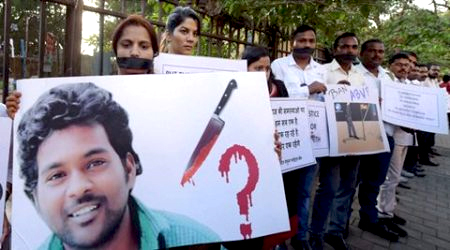Hyderabad, Jan 28: Three teachers of Hyderabad Central University today sat on a one-day hunger strike demanding that Vice-Chancellor Appa Rao Podile be removed and in-charge VC Vipin Srivastava step down, in order to resume academic and administrative activities.
 The protest by teachers comes a day after a second batch of students on an indefinite fast demanding justice for Dalit research scholar Rohith Vemula, who allegedly committed suicide on January 17, were shifted to hospital following concerns over their health condition.
The protest by teachers comes a day after a second batch of students on an indefinite fast demanding justice for Dalit research scholar Rohith Vemula, who allegedly committed suicide on January 17, were shifted to hospital following concerns over their health condition.
A teacher from the Osmania University also joined the protesting teachers in the fast on HCU campus under the banner of SC/ST Teachers' Forum and other concerned teachers.
Earlier, a group of seven students had also been taken to hospital following their deteriorating health condition.
The agitating students yesterday refused to hold talks with Srivastava, who came to the protest site.
They alleged that Srivastava was equally responsible for the "wrong affairs" and demanded that he step-down from the responsibility of interim VC.
Meanwhile, the Joint Action Committee for Social Justice, spearheading the agitation over Rohith's suicide, said that students would intensify the "struggle" till all their demands are met.
Their demands include Podile's resignation, and also Srivastava's from the post of in-charge VC, "sacking" from Union Cabinet of HRD Minister Smriti Irani, employment to a family member of Rohith and Rs 50 lakh compensation to his family.
The selection of Srivastava as interim VC was earlier opposed by the students and SC/ST staff forums as they claimed he headed the Executive Council sub-committee whose decisions were "responsible for the death of Rohith" and that he was one of the accused in the death of another Dalit student in 2008.
Students of most universities in Andhra Pradesh and Telangana yesterday boycotted classes in solidarity with the agitators as they sought "justice" for Rohith.






Comments
Add new comment